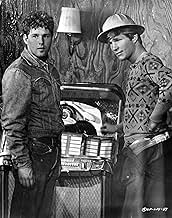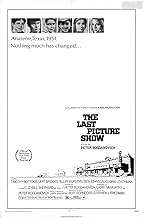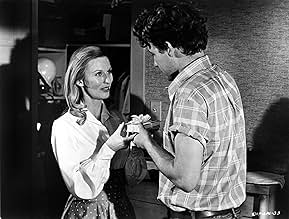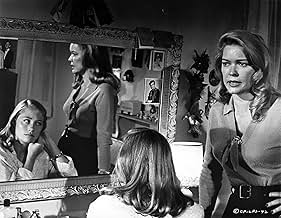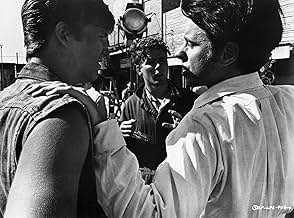En 1951, un grupo de estudiantes de bachillerato alcanza la mayoría de edad en un pueblo sombrío y remoto del oeste de Texas, que está muriendo lentamente, tanto cultural como económicamente... Leer todoEn 1951, un grupo de estudiantes de bachillerato alcanza la mayoría de edad en un pueblo sombrío y remoto del oeste de Texas, que está muriendo lentamente, tanto cultural como económicamente.En 1951, un grupo de estudiantes de bachillerato alcanza la mayoría de edad en un pueblo sombrío y remoto del oeste de Texas, que está muriendo lentamente, tanto cultural como económicamente.
- Ganó 2 premios Óscar
- 19 premios y 22 nominaciones en total
- Charlene Duggs
- (as Sharon Taggart)
Argumento
¿Sabías que...?
- CuriosidadesCybill Shepherd was cast with the option of backing out of her nude scenes if she so desired. She only agreed to do them after asking the opinions of three female costars - Cloris Leachman, Ellen Burstyn, and Eileen Brennan, who all thought she should do them.
- PifiasThe lavalier mic on Duane's tie is visible during the graduation scene.
- Citas
Sam the Lion: You boys can get on out of here, I don't want to have no more to do with you. Scarin' a poor, unfortunate creature like Billy just so's you could have a few laughs - I've been around that trashy behavior all my life, I'm gettin' tired of puttin' up with it. Now you can stay out of this pool hall, out of my cafe, and my picture show too - I don't want no more of your business.
- Versiones alternativasSpecial edition includes seven minutes of footage not included in the original release.
- ConexionesFeatured in The Last Picture Show Re-Release Promo (1971)
- Banda sonoraCold, Cold Heart
(uncredited)
Written by Hank Williams (as Hank Williams Sr.)
Performed by Tony Bennett
In the hands of lesser talents, the subject matter of unimportant people doing unimportant things might have yielded a tiresome soap opera. But the film's script is poetic, the direction is skillful, the B&W cinematography is artistic, the casting is perfect, and the performances are superlative.
The story draws heavily from early American individualism. Life here is mostly physical, not mental. Human relationships are direct, immediate, one-on-one. Except for schools, which are given some prominence, cultural institutions exist in the film only vaguely or not at all. For entertainment, people listen to radio, which features the mournful country-western music of Hank Williams. Or, they go to the town's decrepit picture show, where an elderly Miss Mosey kindly returns money to the kids who got there too late to see the cartoons.
If the film has a weakness it is in the presentation of a realism that is incomplete. We see mostly stifling bleakness, though that is ameliorated somewhat by humor. What we don't see are the uplifting influences and the optimism that sustained agrarian generations through hardships and rough times.
Nevertheless, within the film's story parameters, the film does convey an accurate account of what life was like for ordinary folks in West Texas in the early 1950s. I doubt that this film could be made today. Contemporary audiences have been conditioned to expect non-stop action, loudness, glitz, and overblown special effects, all of which are absent, mercifully, from this film.
Low-key, perceptive, bleak, and melancholy, "The Last Picture Show" easily makes my list of Top Ten favorite films of all time.
- Lechuguilla
- 28 ene 2006
- Enlace permanente
Selecciones populares
Detalles
- Fecha de lanzamiento
- País de origen
- Idioma
- Títulos en diferentes países
- La Última Película
- Localizaciones del rodaje
- Empresas productoras
- Ver más compañías en los créditos en IMDbPro
Taquilla
- Presupuesto
- 1.300.000 US$ (estimación)
- Recaudación en Estados Unidos y Canadá
- 29.133.000 US$
- Recaudación en todo el mundo
- 29.146.255 US$
- Duración1 hora 58 minutos
- Color
- Mezcla de sonido
- Relación de aspecto
- 1.85 : 1
Contribuir a esta página






